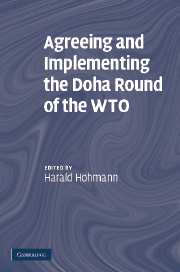Book contents
- Frontmatter
- Contents
- List of Contributors
- Foreword
- Introduction
- The future of the Doha Round
- PART ONE Development policy of the WTO
- PART TWO Trade policy (including competition) and trade facilitation
- 6a Trade policy objectives in the Doha Round – A European Union perspective
- 6b The final phase of the Doha Round
- 7 Further liberalisation of trade in chemicals – can the DDA deliver? A summary of the chemical industry's position on the Doha Development Agenda
- 8 Trade facilitation within the Doha Round: A critical review of recent efforts of the WTO and other international organizations (1996–2006)
- 9 ICN accompanied convergence, instead of WTO imposed harmonization, of competition laws
- 10 Legal principle of integration in the Doha Round: Embedding a social order in the global market
- PART THREE Reform of the dispute settlement system
- PART FOUR Social rights, health, and environment
- PART FIVE Conclusions
- Index
8 - Trade facilitation within the Doha Round: A critical review of recent efforts of the WTO and other international organizations (1996–2006)
from PART TWO - Trade policy (including competition) and trade facilitation
Published online by Cambridge University Press: 23 February 2010
- Frontmatter
- Contents
- List of Contributors
- Foreword
- Introduction
- The future of the Doha Round
- PART ONE Development policy of the WTO
- PART TWO Trade policy (including competition) and trade facilitation
- 6a Trade policy objectives in the Doha Round – A European Union perspective
- 6b The final phase of the Doha Round
- 7 Further liberalisation of trade in chemicals – can the DDA deliver? A summary of the chemical industry's position on the Doha Development Agenda
- 8 Trade facilitation within the Doha Round: A critical review of recent efforts of the WTO and other international organizations (1996–2006)
- 9 ICN accompanied convergence, instead of WTO imposed harmonization, of competition laws
- 10 Legal principle of integration in the Doha Round: Embedding a social order in the global market
- PART THREE Reform of the dispute settlement system
- PART FOUR Social rights, health, and environment
- PART FIVE Conclusions
- Index
Summary
Introduction
The export of goods via ship from one continent to another requires “200 kilograms of documents” for customs, transport, financing and insurance. Trade facilitation is therefore an urgent need!
The term “Trade Facilitation” is often defined as “the simplification and harmonization of international trade procedures,” with trade procedures being the “activities, practices and formalities involved in collecting, presenting, communicating and processing data required for the movement of goods in international trade.” This definition relates to “a wide range of activities, such as import and export procedures (e.g. customs or licensing procedures), transport formalities, and payments, insurance and other financial requirements.”
This topic is not a totally new issue in international trade. Some aspects of it were already on the agenda in the League of Nations in 1923. “The main strategy before the globalisation of the post 1950s was primarily to establish mutual recognition between different regimes and at the most to harmonise the various independent national systems, a process that in many aspects still is very important.” The work by the ECE, the World Customs Organization (WCO), the World Bank, numerous NGOs and most recently by the WTO, especially since the Doha Round, have all contributed to the current international legal discussion on trade facilitation.
“Trade facilitation” was added to the WTO agenda in December 1996, when the Singapore Ministerial Declaration directed the Council for Trade in Goods “to undertake exploratory and analytical work, drawing on the work of other relevant organizations, on the simplification of trade procedures, in order to assess the scope for WTO rules in this area.”
- Type
- Chapter
- Information
- Agreeing and Implementing the Doha Round of the WTO , pp. 197 - 222Publisher: Cambridge University PressPrint publication year: 2008



